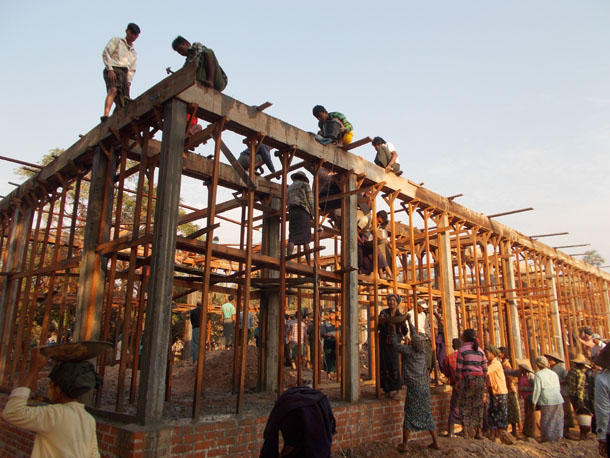CHIANG MAI, Thailand — In 2005, John D. Stevens, a Zen Buddhist monk from Canada, took a trip that changed his own life, and ultimately the lives of thousands of Burmese children.
While he was in Mandalay to teach meditation, one of Stevens’s students, Maung Maung Gyi, a college-educated trishaw driver, took him to his home village. There, Stevens was astounded by what he saw. The villagers lived in rickety thatched-roof houses without access to running water or electricity. The school was nothing more than a small, decrepit wooden building with a corrugated roof, clearly the debris of decades of government neglect.
Stevens—now in his late 60s—knew he had to do something. He began by sending supplies like irrigation pumps and farming equipment to the village, but he still thought there was more he could do. He was asked to help build a school, but Stevens was immediately faced with another problem.
In 2005, Burma was still controlled by a military government that was wary of foreigners’ activities in the country.
“At first, [the government] was suspicious because they were suspicious of all foreigners,” says Stevens. “Is he a missionary? Is he with a government agency? Basically they wanted to know why I wanted to do this.”
Once again, a friend helped out.
Sein Myint, a painter, had met Stevens by chance when Stevens purchased one of his tapestries in Mandalay in 1997. He was friends with Michael Aris, then-opposition leader Aung San Suu Kyi’s husband, but still had a good relationship with the government. While the first school Stevens worked on was constructed on the sly, thanks to Sein Myint’s persistence, the Canadian monk’s efforts were eventually able to earn the approval of local governments, and he and his organization began building schools in earnest.

Maung Maung Gyi, the friend who first introduced Stevens to Burma’s rural poverty, became the head project manager, a role he holds to this day.
Since 2005, Stevens’s charity, 100Schools, a UK-registered non-profit operating out of Chiang Mai, Thailand, has built 49 school buildings in the remote regions of Burma’s Mandalay, Sagaing and Irrawaddy divisions as well as Shan State, in addition to one primary school building in Thailand’s Mae Hong Son province. Over 10,000 students attend the schools. They are now working on constructing two more schools in central Burma.
While the villages’ original schools were technically public and government-run, they were ignored and allowed to fall into disrepair, or were simply little more than shacks to begin with.
To build its schools, 100Schools mobilizes a workforce of 35 Burmese carpenters and masons who work with volunteers from the villages to replace the schools with sturdy, brick buildings that cost US$10 to $12 per square foot—a hefty sum for villages that are largely inhabited by subsistence farmers.
For Stevens’s organization, making buildings that can withstand earthquakes, floods and other natural disasters is a top priority.
“Once we have completed the assessment to build a school, we take all of the responsibilities, and use our own crew to guarantee a good quality building,” says Stevens.
“We create the jobs for all the crew, so they have stayed with us for many years,” he says. “Many of the 35 crew members have been working with us from the beginning.”
Additionally, many of the construction workers’ wives and relatives also have been employed by 100Schools. They make school uniforms, which the charity provides to the schoolchildren for free.
In addition to the school uniforms, 100Schools has provided notebooks and writing utensils to more than 10,000 students in the schools they have built. They also construct dorms for teachers and build desks, chairs, blackboards and toilets.
All this work has earned Stevens the admiration of many villagers around the country who call him, “Mr. John, the big donor,” a title he brushes off, preferring to simply be known as “John.”
“I’m just a penniless guy,” he joked, referring to himself a bridge between real donors and the needs of the people.
But despite the organization’s successes over the past decade, the school situation in Burma remains dire.
The Ministry of Education reported last year that 7,800 school buildings throughout the country are in urgent need of repairs. The ministry said that it had enough resources to repair 2,800 schools, leaving a large amount of buildings without government attention.
Soon, some of Stevens’s work will be taken up by the new government. Last week, the National League for Democracy announced that it will provide free textbooks and uniforms to all primary school students.
But despite a more proactive government, Stevens still expects his organization’s work to continue to be necessary.
“Within two months of the new government being sworn in, we already have received permits to build two new schools,” Stevens says. “So we don’t have any problems [with the new government].”
After focusing exclusively on building schools, 100Schools has expanded beyond simply addressing the material needs of the village students. They have given scholarships to pay for promising students to go to college. One student who learned computer science, now will go back to an underprivileged school to share his knowledge with the students. Another student 100Schools is supporting also plans on returning to rural areas to teach after graduation.
Inspired by his grandmothers—who were also practicing Buddhists—Stevens has wanted to help others since he was a child.
He spent 20 years in France, and then became a Buddhist monk before moving to Southeast Asia. Now Stevens maintains he would be happy to spend the rest of his life working to help children.
“Schools give them opportunities,” he said. “As long as I am healthy enough to do it, I will continue.”

















